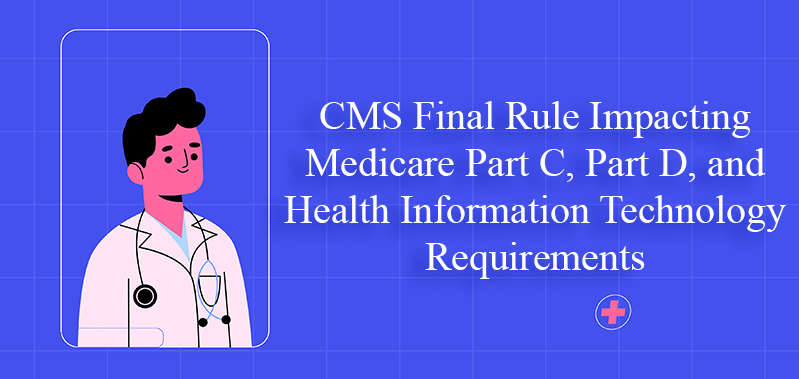
CMS Final Rule Impacting Medicare Part C, Part D, and Health Information Technology Requirements
The Centers for Medicare and Medicaid Services (CMS) has made significant changes to Medicare Advantage (MA) and Medicare Part D plans. These changes are outlined in the Contract Year 2025 Final Rule, published on April 23 and effective June 3, 2024. This rule updates existing policies, introduces new ones, and implements parts of the Bipartisan Budget Act of 2018 and the Consolidated Appropriations Act of 2023.
Fundamental Changes in the Final Rule:-
1. Part D Formulary Updates:
Part D plans can now immediately substitute generic drugs for brand-name drugs without notifying beneficiaries. This change is designed to streamline the process of providing more cost-effective medications to patients, reducing both the administrative burden on providers and the overall cost of prescription drugs for beneficiaries.
In addition to this, Part D plans are now permitted to substitute interchangeable biological products or new unbranded biological products for their branded counterparts. Unlike the generic substitution, this change requires a 30-day notice to beneficiaries. This notice period ensures that patients are informed about the change and can discuss any concerns with their healthcare provider before the substitution takes effect.
Moreover, plans are also allowed to substitute any biosimilar biological product for its reference product, again with a 30-day notice to beneficiaries. This provision aims to increase the use of biosimilars, which are often less expensive than their reference products, thereby promoting cost savings while maintaining high standards of patient care.
2. Agent/Broker Compensation Rules:
The Centers for Medicare and Medicaid Services (CMS) has introduced new rules to prevent Medicare Advantage (MA) plan sponsors and third-party entities from structuring payments to agents and brokers in ways that bypass regulatory caps. Under these rules, contracts must not create incentives that could influence agents or brokers to recommend plans that do not best meet the needs of beneficiaries. Additionally, agents and brokers will now be subject to a single, increased compensation rate cap, and secondary administrative payments will be eliminated. These measures aim to ensure that agents and brokers provide objective and unbiased recommendations to beneficiaries, promoting plans that genuinely suit their healthcare needs.
3. Consent Requirements for Third-Party Marketing Organizations (TPMOs):
Beneficiaries must now provide explicit written consent for each transfer of their information between Third Party Marketing Organizations (TPMOs). This new requirement aims to reduce the volume of unwanted calls, texts, and emails from TPMOs attempting to sell Medicare Advantage (MA) and Part D plans. By implementing this measure, the Centers for Medicare and Medicaid Services (CMS) seeks to protect beneficiaries from aggressive marketing tactics and ensure their privacy and consent are respected in the marketing process.
4. Standardizing the Risk Adjustment Data Validation (RADV) Appeals Process:
Medicare Advantage (MA) plans must now fully exhaust the administrative appeal process for medical record reviews before challenging overpayment calculations. Alternatively, MA plans have the option to challenge the overpayment calculation directly, but if they choose this route, they will forfeit the right to appeal the medical record review findings. This new rule ensures a structured and thorough appeals process, promoting accuracy and fairness in the resolution of disputes regarding overpayments
5. Part D Medication Therapy Management Program:
The Centers for Medicare and Medicaid Services (CMS) has finalized a list of 10 chronic diseases that determine eligibility for the Medication Therapy Management (MTM) program. While Part D plan sponsors are allowed to include additional chronic diseases in their criteria, they must also incorporate this base group. Additionally, the maximum number of drugs that a plan sponsor may require for targeting an enrollee remains at eight, and all Part D maintenance drugs must be included in the targeting criteria. These measures aim to ensure that the MTM program effectively identifies and supports beneficiaries with significant medication needs.
CMS has not yet established a standard for identifying overpayments that need to be returned to avoid False Claims Act violations. This may be addressed in future rulemaking. These changes aim to improve Medicare Advantage and Part D plans by increasing oversight, enhancing patient protections, and ensuring better access to necessary healthcare services. The rule also addresses various administrative and operational aspects to streamline processes and improve overall efficiency in the Medicare system.





CMS has not yet established a standard for identifying overpayments that need to be returned to avoid False Claims Act violations.
2024-06-18
The rule also addresses various administrative and operational aspects to streamline processes and improve overall efficiency in the Medicare system.